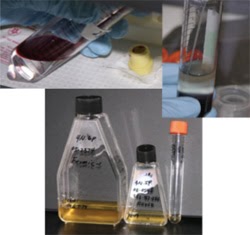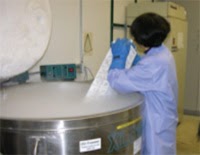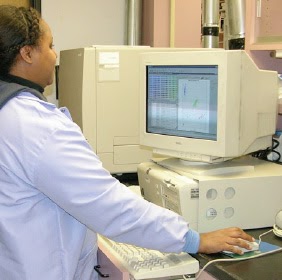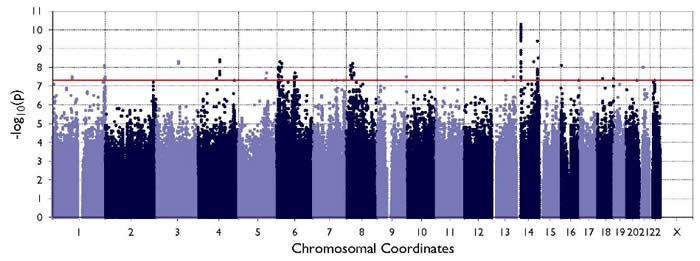DRC Human Genetics Core
 Genetic susceptibility contributes significantly to the development of diabetes and its complications. As shown by recent successes in genetic mapping, the technological capability now exists to identify many of the responsible genes.
Genetic susceptibility contributes significantly to the development of diabetes and its complications. As shown by recent successes in genetic mapping, the technological capability now exists to identify many of the responsible genes.
To be successful in such endeavors, it is necessary to combine expertise in genetic epidemiology, clinical investigation, molecular genotyping, DNA sequencing, mathematical genetic analysis, and functional characterization. The goal of the Human Genetics Core is to offer such expertise to DRC investigators conducting studies into the genetics of diabetes, its complications and related disorders, so that they can employ cutting-edge molecular and analytic methodologies in this rapidly developing field.
Core Services
- Assistance in the development and successful completion of well-designed genetic studies.
- Establishment and storage of EBV-transformed lymphoblastoid cell lines (LCLs), as well as PAXgene tubes.
- Provision of access to molecular methodology for genome-wide association studies (GWAS) and specialized (e.g., the exome chip) single nucleotide polymorphism (SNP) testing, candidate gene sequencing, whole exome sequencing (WES), whole genome sequencing (WGS), and large-scale gene methylation analysis (by chip).
- Assistance with mathematical genetic epidemiologic analysis, including analysis of multi-omics data.
- Making available to investigators induced pluripotent stem cells (iPSCs), as well as diabetes-relevant cells derived from them.
- Provision of training in genetic techniques to DRC investigators and staff.
- Provision of a national genomics resource for the study of type 2 diabetes (T2D), its risk factors, complications, and associated disorders across multiple race/ethnic groups.
The Lymphoblastoid Cell Line Facility
Setting up New Cell Lines

Epstein-Barr Virus transformation of B-lymphocytes results in immortalization of lymphoblastoid cell lines that can then be maintained indefinitely. Whole blood is collected in yellow top (ACD-A) tubes, stored at room temperature and delivered to the laboratory by courier or express mail. Following Epstein-Barr virus transformation the lymphoblastoid cell lines are carefully frozen to ensure maximum viability upon thawing. At the time that cell lines are ready for freezing, cell pellets containing approximately 20 x 10E6 cells are aliquoted for DNA and frozen non-viably, but this number can be modified depending upon the needs of the DRC investigator. For immediate molecular studies, cell pellets can be given to the investigator or to the Genotyping Laboratory without being frozen. Lymphoblastoid cell lines are carefully monitored for contamination (bacterial, fungal, and mycoplasmal). Identification is by ID number; to assure privacy, only the study team can link the ID to a study subject's identity.
Initial transformation success is > 95%. If any sample is unsuccessful, we contact the study team and request that another sample be obtained from the subject, if possible. When getting a second blood sample from a study subject, we recommend also drawing several purple top, EDTA tubes for DNA as back-up, in the rare event the second transformation also fails.
Existing Lymphoblastoid Cell Lines

Previously transformed and frozen lymphoblastoid cell lines can be thawed and regrown if a DRC investigator has utilized all of the non-viable cell pellets that were initially aliquoted, or if the investigator requires viable cells in culture (as for example, may be needed for RNA isolation for expression studies). T25 flasks, containing approximately 25 x 10E6, are typically what will be provided, but larger quantities may be obtained if needed for specific studies.
Genotyping Laboratory Services
A variety of genotyping technologies are available to DRC investigators, for use in either linkage or association-based study designs. The selection of method depends on the number of samples and the number of SNPs to be genotyped. Dr. Taylor assists DRC investigators in determining which approach is most appropriate for the proposed project.
Illumina: The Illumina BeadXpress system with VeraCode technology is a laser detection bioassay platform supporting genotyping, gene expression, methylation, and protein-based assays. This technology consists of the VeraCode bead and BeadXpress Reader. The VeraCode bead is a cylindrical glass microbead carrying a unique refraction-based holographic code, permitting tracking of multiplex assay markers. VeraCode microbeads allow for a highly stable and robust platform, with 25-30 replicates of each bead type optically sampled up to 12 times, providing ~300 independent data points per analyte. The high-throughput, 2-color laser detection BeadXpress reader identifies individual bead types using their holographic code data and detects their assay hybridization signals. Data are exported and analyzed using Illumina's VeraScan software. Flexibility in multiplexing allows genotyping of 1 to 384 SNPs of interest specifically chosen per study.
Genomewide Scans
 Genome wide genotyping in the Core is performed with Illumina BeadChip® technology. Currently, up to 4.3 million SNPs can be genotyped/sample. Beadchips utilize pools of oligonucleotides; a single oligo in the pool contains both a unique decoding sequence ["zipcode" oligo] and a locus-specific sequence that identifies the individual SNP. These oligos are ligated to glass beads for random positioning in the arrays. This deposits each bead on the sector an average of 30 times, providing multiple measurements/SNP and contributing to the technology's low error and high reproducibility. Arrays are read by confocal microscopic reader; the software combines bead images, bead type, and original SNP information into called genotypes. The Illumina Genome Studio software also provides cluster plots for a visual quality assessment of each SNP if necessary. Problems with assay calling are also detected by comparing calls of 2% duplicate samples that are included in each run.
Genome wide genotyping in the Core is performed with Illumina BeadChip® technology. Currently, up to 4.3 million SNPs can be genotyped/sample. Beadchips utilize pools of oligonucleotides; a single oligo in the pool contains both a unique decoding sequence ["zipcode" oligo] and a locus-specific sequence that identifies the individual SNP. These oligos are ligated to glass beads for random positioning in the arrays. This deposits each bead on the sector an average of 30 times, providing multiple measurements/SNP and contributing to the technology's low error and high reproducibility. Arrays are read by confocal microscopic reader; the software combines bead images, bead type, and original SNP information into called genotypes. The Illumina Genome Studio software also provides cluster plots for a visual quality assessment of each SNP if necessary. Problems with assay calling are also detected by comparing calls of 2% duplicate samples that are included in each run.
Specialized Gene Chips
Genotyping with specialized Illumina chips is available to DRC investigators. These include the Human Exome Beadchip (~250,000 SNPs; the majority of which are rare non-synonymous, splice or nonsense variants identified through exome sequencing). A second generation ImmunoChip (ImmunoArray-24v2.0) is available that genotypes over 250K SNPs selected by researchers across a diversity of autoimmune diseases, including type 1 diabetes. This chip provides high density SNP coverage of the Major Histocompatibility Complex across world-wide populations as well as of the major loci associated with autoimmune diseases in GWAS. A Methylation Chip probes over 850K differentially methylated cytosines using a bisulfite method, including CpG sites outside of islands, differentially methylated sites identified in comparison of tumor and normal tissues, ENCODE and FANTOM5 enhancers, ENCODE open chromatin sites, DNase hypersensitive sites, and miRNA promoters.

Sequencing
DRC investigators have the ability to obtain custom targeted, whole exome, or whole genome sequencing in the genomics core. The combination of expertise and instruments established in the genomics core enables us to uniquely identify the best application for each project depending on sample size, sample integrity, price and turnaround time. The Core offers complete wet-lab and bioinformatics analyses. Single cell genome and epigenetic sequencing is also expected to be offered in the near future.
Bioinformatics Consulting
Investigators requiring assistance in identifying SNP markers appropriate for their research activities, or assistance in locating potential candidate genes of interest can consult with Dr. Taylor. Depending on the complexity of the search, he will either perform the search, or provide instruction to the research team on how to access various public databases.
Genetic Epidemiology Support Services
DRC investigators can receive assistance with a variety of study design and analytic methods. Depending upon the prior experience investigators have with human genetics studies, they may wish assistance in planning studies from inception on, or may only request assistance with deciding which type of genetic analysis to apply to their data after collection. Investigators have the option of requesting that analyses actually be performed by Core personnel as well as the option of receiving training in how to utilize the various genetic analysis programs themselves.
There are a variety of study designs that can be utilized for investigations into the genetic basis of diabetes and its complications. Choice of a specific design depends upon a number of factors, including the types of subjects available to the investigator, the specific phenotypes to be examined, and the hypotheses being tested. Core personnel can also provide assistance in estimating power and sample size, which vary depending upon whether a candidate gene or a systematic mapping approach is used, along with the degree of polymorphism of the DNA markers. The use of qualitative traits or quantitative traits and the methods of analysis selected will also influence power.
Consultation is available for a wide variety of genetic analyses, not just for analysis of genotyping data. For genotyping data, assistance with both association studies and linkage analysis is available. We have the computer programs and expertise necessary to analyze genome wide association and to impute additional genotypes. We also offer pathway analysis.
Induced Pluripotent Stem Cell (iPSC) Services
The iPSC Core Facility uses the latest techniques to derive, expand, and characterize induced pluripotent stem cells (iPS cells) that can be used to model complex human diseases including those affecting the liver, muscle, pancreas, and adipose tissue. iPS cells can be derived from easily obtained adult cells or from existing LCLs by modifying their genetic makeup and sending them back to an embryonic state. The cells allow investigators to explore early cell development and differentiation into tissues that are important in insulin production and insulin resistance. By using cells from subjects with specific genetic variants to create iPSCs, researchers will be able to examine their impact on cell differentiation and function.
Because the techniques required are complex and time-consuming, the Core will serve as a support facility for DRC investigators. The Core maintains and supplies non-integrating human iPSC lines from normal subjects and also has the ability to derive new iPSC lines as needed. The staff will generate non-integrating iPSC lines from diseased or normal subject cells provided by investigators. This facility also develops and evaluates new methodology for human iPSC generation and propagation, and has successfully developed protocols to create iPSC from LCLs. The Core can provide formal training in practical aspects of human iPSC experimentation, disease modeling and differentiation techniques.
Rates
The Human Genetics Core provides services to DRC investigators at a discounted rate (see Table). If a DRC investigator requests more than the allotted number of procedures per year, the balance will be charged at cost.
DRC Recharges
|
Procedure |
Discount DERC Rate - Price Per Sample |
# Procedures/ Year/ Investigator at Discount Rate |
Non-Discounted DERC Rate - Price Per Sample (Actual Cost) |
|---|---|---|---|
|
Establish lymphoblastoid cell line/ freeze 5 pellets |
$237 |
15 |
$315 |
| Bioinformatics consulting, hourly rate, genotyping | $40/hr | 10 hrs. # | $60/hr |
| Statistical and/or study design consulting, hourly rate | $40/hr | 10 hrs. # | $60/hr |
| Bioinformatic analysis and consulting, sequencing | $60/hr | 10 hrs. # | $100/hr |
| Illumina® genome wide association (Includes reagent and chip costs; Minimum chip purchase volumes apply); 250-500 samples@ - discount provided on labor costs HumanCore Chip HumanOmniExpress 700K Chip ZhongHua Chip MEGA Chip HumanOmni 2.5 Chip+ SOL Chip |
$56 |
1 GWA |
$66 |
| Illumina® Exome Chip | $54 | 1 run | $64 |
| Whole Exome Sequencing Certified Life Exome Provider for Amplicon based exome (includes sample prep, (fragmentation, library prep, enrichment, and QC, sequencing (100x) and basic bioinformatics (e.g., VCF) *2-3 week turnaround |
$700 per sample (minimum 2 samples) |
10 runs | $1,000/sample |
| Microbiome species profiling (fungal or bacterial profiles); library preparation, sequencing, species annotation and quantification | $300/sample (minimum 6 samples) |
8 runs | $400/sample |
| Targeted high throughput Gene/Amplicon Sequencing: (e.g. OMIM, cancer panels) | Custom Inquire (minimum 12 samples) |
||
| Digital qPCR-Targeted Copy Number Variation and high throughput genotype validation (Amplification and assessment using Fluidigm nanofluidics array and qPCR) | $600–1,200 4800 or 9600 qPCR (48 or 96 amplicons or variants x 48 or 96 samples) |
5 | $850–1,700 (48 or 96 amplicons x 48 or 96 amplicons) |
| iPSC (induced pluripotent stem cell) development: includes generation, characterization and distribution (3‐5 clones) | $9,000 | 1 cell line | $10,000 |
Core Contacts
Kaye Roll, RN
Genetics Study Coordinator
Institute for Translational Genomics and Population Sciences
Los Angeles Biomedical Research Center at Harbor-UCLA Medical Center
1124 West Carson Street, Bldg. E-5 Torrance, California 90502
310-974-9329
310-533-8519 (fax)
kroll@labiomed.org
Jerome Rotter, MD
Core PI
jrotter@labiomed.org
Mark Goodarzi, MD, PhD
Core PI
mark.goodarzi@cshs.org
Lymphoblastoid Cell Line Facility
Y-D Ida Chen, PhD
jchen@labiomed.org
Genotyping Laboratory
Kent D. Taylor, PhD
ktaylor@labiomed.org
Statistical Genetic Analysis
Xiuqing Guo, PhD
xguo@labiomed.org
Sequencing
Jie Tang, PhD
jie.tang@cshs.org
iPSC
Dhruv Sareen, PhD dhruv.sareen@cshs.org
